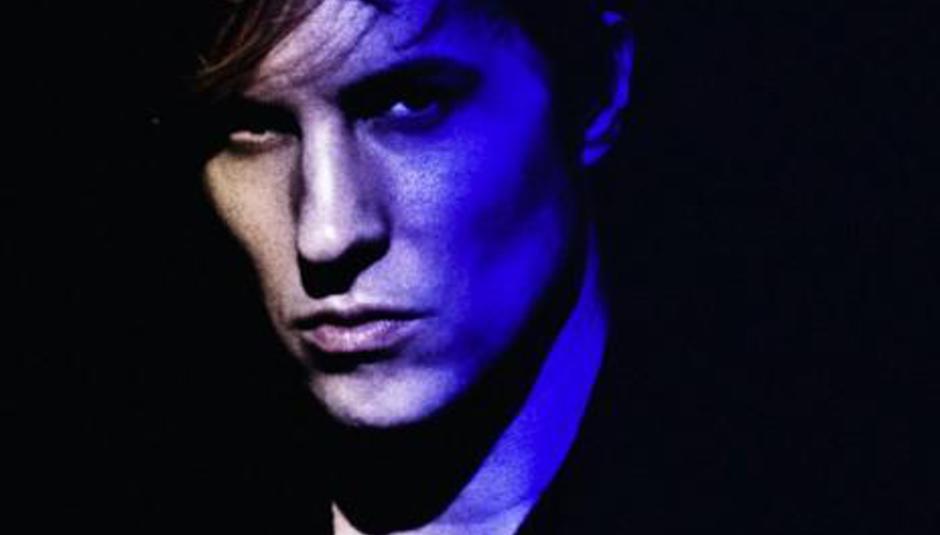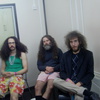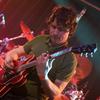As the founder member and unassuming politically-aware mouthpiece behind groundbreaking electronic noise combo Atari Teenage Riot, Alec Empire can be classed as something of an underground icon. Born in West Berlin but currently based in London, Empire's work with Atari Teenage Riot spawned a genre and record label all of its own. Digital Hardcore may have come about due to his refusal to compromise with Phonogram back in the early nineties, but there's little doubt that the sound itself was heavily influential in the development of bands like Crystal Castles and HEALTH a decade or so later.
Having recorded three albums with ATR, the band went on something of an unplanned hiatus lasting over a decade, due in no small part to the death of fellow founder member Carl Crack in 2001. Having already embarked on several solo records during ATR's heyday, Empire continued to release various albums and EPs both under his own name and numerous aliases including Nintendo Teenage Robots and The Hellish Vortex among others.
Then, earlier this year, it was announced that three of the core members of ATR - Empire, Nic Endo and Hanin Elias would be working together again with the aim of playing live and possibly recording new material. While Elias has since refrained from the project, Empire, Endo and new member MC Kidtronik played several festivals during the summer, as anyone fortunate enough to witness their blistering performance at London's Offset in September will remember. Having put out their first single in over a decade, 'Activate!', last month, Atari Teenage Riot have also just finished their first tour on UK shores since 1999. With an album due out next year, to say DiS is mightily excited would be an understatement, so without further ado, take it away Alec...
How does it feel to be performing with Atari Teenage Riot again?
Alec Empire: It feels very strange. To be honest, it all worked out really different to what we expected. The idea was for us to just do one show in London but we got so much positive feedback that we played three nights in Tokyo and the reaction was crazy. We were taken aback by the energy of the audience out front. I guess we kinda thought that nobody would like the music we make, so to receive that sort of unplanned adulation - especially in our position - was really astounding. What was also very interesting was that a lot of young people came to the shows who would have been too young to see us the first time around. One guy came up to me in London and said "You know, when you last played Reading in '99 I was four years old!" I think people can see that we've always embraced progression, and even now we still feel the same way. If I didn't think we had anything new to offer we wouldn't be doing this. It's not rocket science and it's all about the energy more than anything. If I want to be a technical musician I use the studio for that. I've written film scores but to me there's a time and a place for that kind of thing. I've seen too many bands get caught up in trying to show off their skills whilst playing live that they lose the passion in the music, whereas the way Atari Teenage Riot works is totally refreshing, simply because we don't always know what's coming next either.
How did you choose what to include in the live set?
AE: We always make our sets up as we go along. I don't think we've ever worked strictly off a pre-structured list of songs. Our live set up is almost like a DJ - we can press a button on a drum machine and 909 and the music plays. It's all about the way we deliver the words really.
I think Atari Teenage Riot's influence on current bands is there for all to see, people like Crystal Castles and HEALTH being two obvious examples that spring to mind.
AE: I guess so, but ultimately that's the way music works. What I like about the two bands you've just mentioned is that while they fuse noise with beats, they're both exceptionally creative and could never be accused of copying us or anyone else for that matter. I got a Twitter message recently from one of the guys in Pendulum where he was saying they always listen to us before they go on stage, and I think that's a positive thing. Again, they've got their own sound so while there's an influence, it doesn't really sound anything like Atari Teenage Riot. I'm fine with bands citing us; there's never a point where I listen to a record and think "Shit! Why didn't I think of that?" Sometimes there's a danger of trying to be too extreme for the sake of it.
When Atari Teenage Riot first emerged you were one of the most extreme bands around, if not THE most extreme.
AE: I think we seized the time, particularly with what we were doing with the Digital Hardcore label. We were influenced by other bands ourselves...Public Enemy for instance and X-Ray Spex we loved too. A lot of Japanese noise like Merzbow played a big part in developing our sound as well; people sometimes forget that a lot of really good stuff going on over there at the time. We started around the same time as Riot Girl and I remember seeing Huggy Bear and Bikini Kill back then...I think music is like a language; it's a living thing and I think at that time a lot of people got hit by the extreme nature of a lot of those artists but for us it just felt normal. We've always set out to be creative rather than commercially successful because I honestly think commercial music kills creativity. I would love the music scene to be as diverse as possible. I'm not into this conformist pop culture where everyone is steered towards liking one thing, so in that way I think the Internet has been a great thing in allowing a worldwide platform for artists who would never have had that opportunity 10-15 years ago. Some people don't like the way technology has fragmented genre compatibility but I think it could be an advantage in the long run.
Some of your lyrics are very relevant in the current climate, 'Western Decay' being one song that springs to mind. Was it something that played a part in Atari Teenage Riot's return?
AE: Of course. We were very aware of that. It was one of the reasons why we did that first show back in May and continued playing ever since. A lot of what we wrote about back in the 1990s felt like a nightmare vision of the future. Of course we reflected on what was happening at the time as well, but it's like when I listen back to some of our earlier lyrics and look around me and there are CCTV cameras on every street corner, the governments and big corporations do try to control the empire...it's not like we're a bunch of overly paranoid Germans or something! It's like with capitalism. I think it's fine for a minority but most people don't enjoy the same benefits and it's very obvious.
You must have seen a lot of changes in the music industry since your last record. Would you say they're for the better or not?
AE: There's two ways of looking at it to be honest. I like to see the majors go down, but of course the flipside to that is watching the independent labels struggle. I think the biggest losers there are are smaller bands that are just starting out, because it is really difficult for them to make any money back without that network of smaller labels. When I hear people saying we should be downloading everything to beat the corporations like Sony I also have to point out to them that it affects everyone, and more often than not it's the smaller bands and labels that eventually lose out. It really upsets me when I see young bands having to stop making music after two or three years of trying because they can't afford to carry on. That makes me sad, particularly when I look at the festival line-ups we've played over the course of this summer. Nearly all of the headliners have been the same - Muse and the Red Hot Chilli Peppers for example, which I guess fully emphasises the widening gulf between success and failure from a financial point of view.
It's interesting that when the two bands you mentioned first started out they were seen as very leftfield and quite subversive whereas now both are considered as part of the mainstream. Doesn't that concern you somewhat?
AE: Do you know, I guess that's the nature of the music industry. Music travels to a wider audience and suddenly becomes more acceptable. I have respect for Muse and the Chilli Peppers in that they've infiltrated a market that previously would never have given them the time of day, but I have more respect for bands like Liquid Liquid who've been around for a long time themselves but just made music they want rather than what they're almost expected to make. I think as a musician you have to avoid falling into that trap. Some people do it the wrong way by always going for what they perceive to be popular; we always go for the opposite I guess. Some people are too greedy and just go where the money is, but the problem with profit is it can kill off the whole idea.
Do not see Atari Teenage Riot being asked to headline stages at Reading, Leeds and Offset this summer as commercially acceptance of your band, albeit on a smaller scale?
AE: It's amazing that people think so highly of us, particularly when we've been away for so long, but I don't think we were booked as a way of increasing ticket sales.
October's download single 'Activate' was the first new Atari Teenage Riot material in over a decade. Will there be an album to follow?
AE: We recorded a bunch of songs over the summer, and then when we get back from this tour we're going to look at compiling something with the intention being to get it out in the early part of 2011. It's going to be a concept-based record, mainly because people don't tend to listen to albums in full any more. We've got about twelve songs in total and we're just going to see how it all fits together before we decide what the final tracklisting will be and how many make the final cut. The fun part for us is that we're under no pressure; we can just do what we want but at the same time while the energy is so great we wouldn't want to miss the opportunity either. I have a solo album that's finished as well that I'm delaying so I can concentrate on ATR. The album was actually supposed to have come out in September.
Hanin Elias has chosen not to get involved with Atari Teenage Riot at this stage. What's the reasoning behind it?
AE: The return of Atari Teenage Riot was actually her idea, but when it came to replicating the part she played vocally in previous years, she had serious problems with her screaming voice. The door is still open, but what people don't realise is that Nic (Endo) contributed a lot of the vocal parts even back then, especially on the 60 Second Wipeout record. We've always had a collective mentality and no one individual could ever be bigger than Atari Teenage Riot as a whole. We always wanted to be like a punk rock band because most of the techno acts around were pretty faceless.
I think that's probably a good summary of Atari Teenage Riot in that you mixed punk's philosophies with new technology.
AE: Maybe, I don't know. I suppose Throbbing Gristle and Cabaret Voltaire had a good go at it at least a decade before us.
For more information on Alec Empire and Atari Teenage Riot follow the link.






















